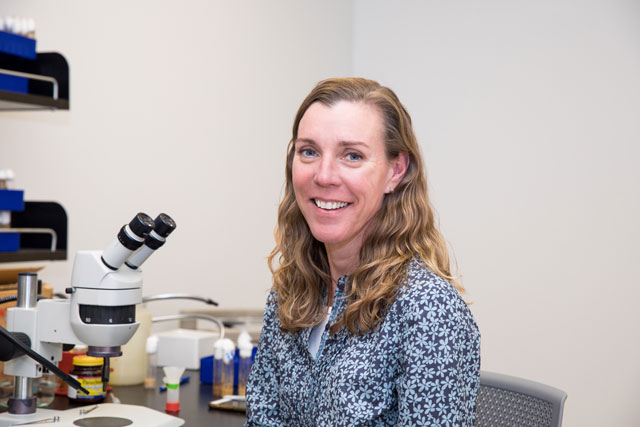
With the race to a COVID-19 vaccine well underway, TCNJ’s resident immunology expert helps break down what it all means.
Amanda Norvell, biology professor and interim dean of TCNJ’s School of Science teaches courses in molecular immunology, and the biology of human disease and prevention.
Here are five things she says we should know about what vaccines are, how immunization works, and how we should approach a potential COVID-19 vaccine.
1. Vaccines jump-start your immune system.
Norvell explains that a vaccine is something that’s introduced into the body to induce an immune response. A vaccine shouldn’t make you sick, but it will trigger your body to mount an immune response to fight off the disease-causing agent, and “remember” it so you’ll be able to efficiently and effectively attack the pathogen if it is ever introduced into your body again.
According to the Centers for Disease Control and Prevention, vaccines are usually administered through needle injections, but can also be administered by mouth or sprayed into the nose.
“A good vaccine should induce long-lived, specific immunity to a particular pathogen,” she says.
2. Being vaccinated doesn’t always equal immunity.
Norvell explains that within any population, there will be individuals with immune systems that, for a variety of reasons, aren’t capable of mounting the desired immune response to a particular pathogen.
“Good immunizations should induce protective immunity in most people, but vaccines likely do not induce protective immunity in every member of the population.”
3. There’s power in numbers.
When most of the people in a population are immune to a specific disease-causing agent, person-to-person spread of that pathogen becomes much less likely. As a result, members of that population will be less likely to encounter the disease and should therefore be protected — even those who aren’t immune or those who haven’t been vaccinated.
This phenomenon is called herd immunity.
Norvell says that to provide optimal protection of everyone in the population, a threshold of individuals needs to be immune.
“For highly contagious diseases like measles, estimates are that greater than 90 percent of a population needs to be immune to achieve herd immunity,” she says.
4. But having immunity doesn’t always mean that no one gets sick.
“The major goal of vaccination is to prevent illness, so the gold standard for effectiveness is that an immunized individual does not get sick,” Norvell says.
But protection could be more nuanced. For example, a vaccine may not prevent individuals from getting sick, but it may decrease the severity of their symptoms.
5. What this all means for a COVID-19 vaccine.
“Perhaps a new vaccine may not decrease the absolute number of infected individuals, but it might decrease the fatality rate or the number of individuals who need to be placed on ventilators,” Norvell says. “If such a vaccine conferred enough protection to limit the severe effects of the disease, then it could be considered effective.”
As the trials forge ahead and vaccines make their way to market, Novell’s best advice is to educate yourself, and ask questions.
“Everyone should try to use reliable sources about our current understanding of the benefits and potential risks of each therapeutic candidate,” Norvell says. “Seek input from your physician and don’t be afraid to speak up.”
— Emily W. Dodd ’03
